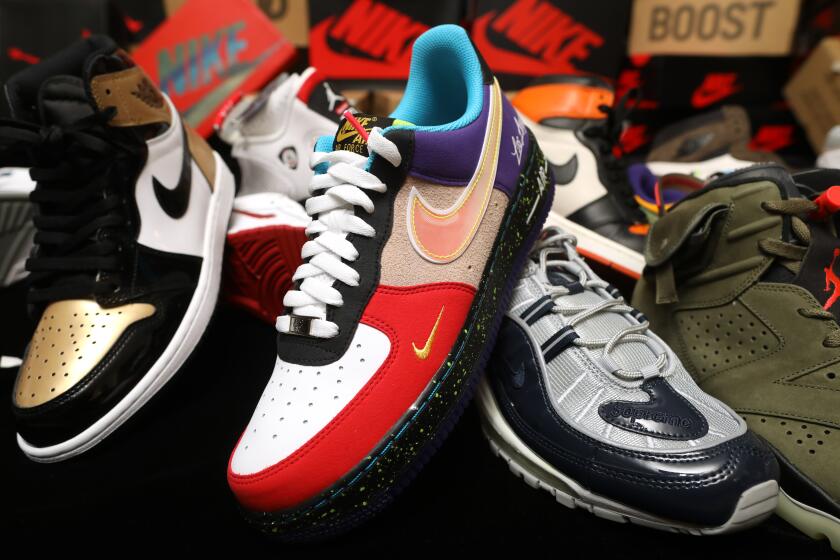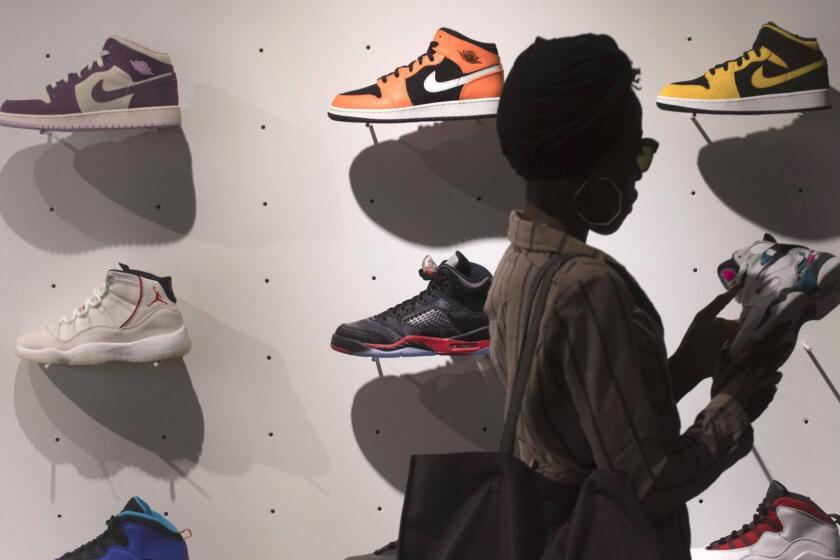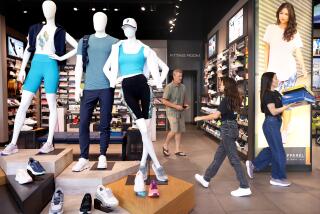How fake Air Jordans turned these L.A. pals’ sneakerhead dream into a powerhouse platform
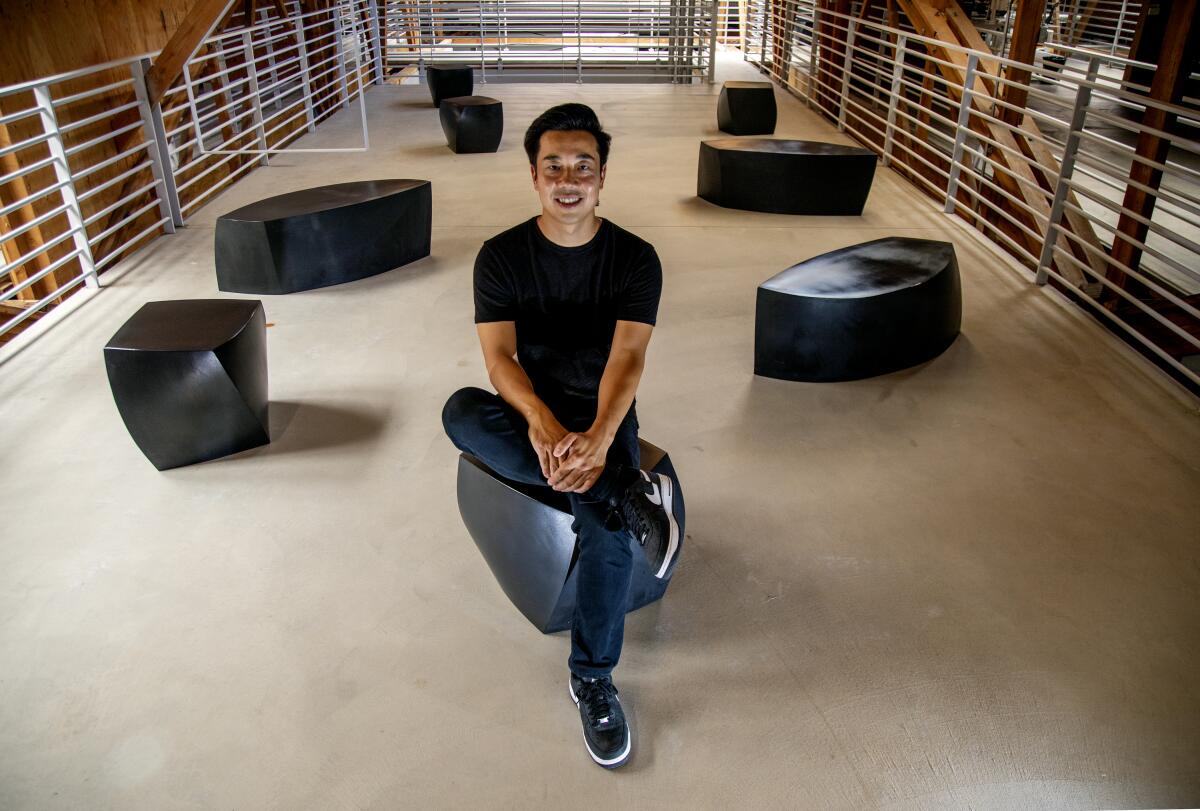
Freshly unboxed, the Air Jordan 5 Retro Grapes were marvelously throwback — and totally fake.
For the record:
4:14 p.m. July 19, 2021This story incorrectly says recent fundraising by GOAT Group brings the total the company has raised since 2015 to $392.6 million. The total is $492.6 million.
The reissued classics just didn’t look, smell or feel like the real thing. Los Angeles entrepreneur Daishin Sugano couldn’t believe how badly he’d been ripped off by an EBay sneaker reseller.
The discovery was particularly rankling for Sugano. When he was 10, Sugano had earned a pair of Air Jordan 5 Grapes as a reward for a great report card, the same shoe worn by superstar Michael Jordan when he played for the Chicago Bulls. That pair launched a thousand sneakerhead dreams, and his order many years later was for what was supposed to be a 2013 official re-release version.
Sugano shared his disappointment at the botched purchase with fellow UC Berkeley grad and pal Eddy Lu, his partner in several underwhelming business ventures since the two decided to ditch their corporate jobs in 2007 to become entrepreneurs.
Their latest startup had fizzled, so they cooked up another idea: A reseller platform that would win the trust of sneakerheads everywhere by authenticating everything.
No counterfeits. No purchases that mysteriously never arrive.
GOAT Group was born out of that in 2015. Since then, what started as a Los Angeles sneaker reseller platform has expanded into luxury apparel sales, with 30 million members and 600,000 sellers in 170 countries.
“We wanted to make sure that no consumer had this issue ever again,” Lu said. “Why are we spending hundreds of dollars online, and we still have to worry if it’s real or fake? That’s just ridiculous, so it’s been in our DNA at every point in time.”
In June, big-name investors injected an additional $195 million into GOAT, bringing the total raised since 2015 to $392.6 million and its valuation to $3.7 billion, more than double the valuation from its previous funding round in September.
In the streetwear culture we live in, it’s a statement of who you are and how you feel and what you believe in.
— Karsen Woods, 888 The New World
GOAT, named after the phrase “greatest of all time,” plans to use its cash hoard to expand its footprint and step deeper into streetwear and designer clothing, further differentiating the firm from its biggest reseller competitors, including Detroit-based StockX, which bills itself as the Wall Street of cool sneakers and luxury goods.
The company said it has 13 fulfillment centers worldwide and plans to add four more by the end of 2021, with an eye toward international growth.
How two friends from Southern California built a 1,000-employee reseller platform and lifestyle brand shows the payoff from pivoting, again and again, through a string of failed startups to find the winning market niche.
“These guys clearly wanted to be entrepreneurs, at first in categories that were not going to catch on easily,” said George Belch, marketing department chairman at San Diego State University.
“When they launched GOAT, they really hit the right market segment. They went in and addressed a problem that the industry was having, which was fake products and authenticity, the things that made potential customers very leery of buying online,” Belch said.
Lu, GOAT’s chief executive, and Sugano, chief product officer, first tried their entrepreneurial skills on a series of 99-cent game apps for the iPhone, which had just hit the market. Then came gourmet tea, golfing attire, a debt-laden foray into cream-puff store franchises and GrubWithUs, a meals-with-strangers app that debuted with promise but fizzled.
GOAT had its stumbles, too. In 2015, not long after the company was founded, a Black Friday stunt to sell a limited number of rare shoes at retail price backfired when GOAT’s app repeatedly crashed, leaving shoppers irate.
A top Nike executive and her shoe reseller son face the wrath of sneakerheads, who think the shoe game is rigged against them.
Early investors stuck it out.
They were boldface names beginning with startup accelerator firm Y Combinator, the venture fund that helped launch Airbnb, DoorDash, Twitch and Reddit, among others. Part of the initial $7.6-million funding round also came from Upfront Ventures (backers of Bird, Ring, Truecar), leading Silicon Valley venture capital firm Andreessen Horowitz, and Reddit co-founder Alexis Ohanian.
Subsequent rounds of funding drew other big backers, including some huge venture capital firms and Foot Locker Inc., which invested $100 million in 2019.
“They are being supported by a Who’s Who list of investors,” Belch said.
GOAT’s systems have become more sophisticated over the years, possibly intimidating first-timers who might think they can upload their own photos and quickly sell their shoes to buyers.
Unlike other big resale platforms, GOAT goes with nicely staged and professionally shot photos of the shoes on sale. And it acts as more than a middleman, with a rigorous authentication process before shoes are packaged and finally shipped.
The company does all product authentication in-house, partly using artificial intelligence to supplement teams of people investigating potential fakes, Lu said. The mix of technology and human instinct is especially crucial for this task, he said: “You can’t do it with just pictures alone, because authentication is so much about the feel of the shoe, the smell of the shoe, for example.”
Customers sometimes grumble on Instagram about the time it takes to authenticate or ship merchandise. But even though sellers know they won’t get paid until their products are authenticated, a stunning number try to sell fakes through the platform, Lu said.
In 2019, the most recent year for which GOAT has complete statistics, the company caught $72 million in counterfeit shoes, up from $34 million the year before, and the figure probably increased in 2020, Lu said. “As our marketplace grows and our gross merchandise value grows, there’s bound to be more fraud that enters the system.”
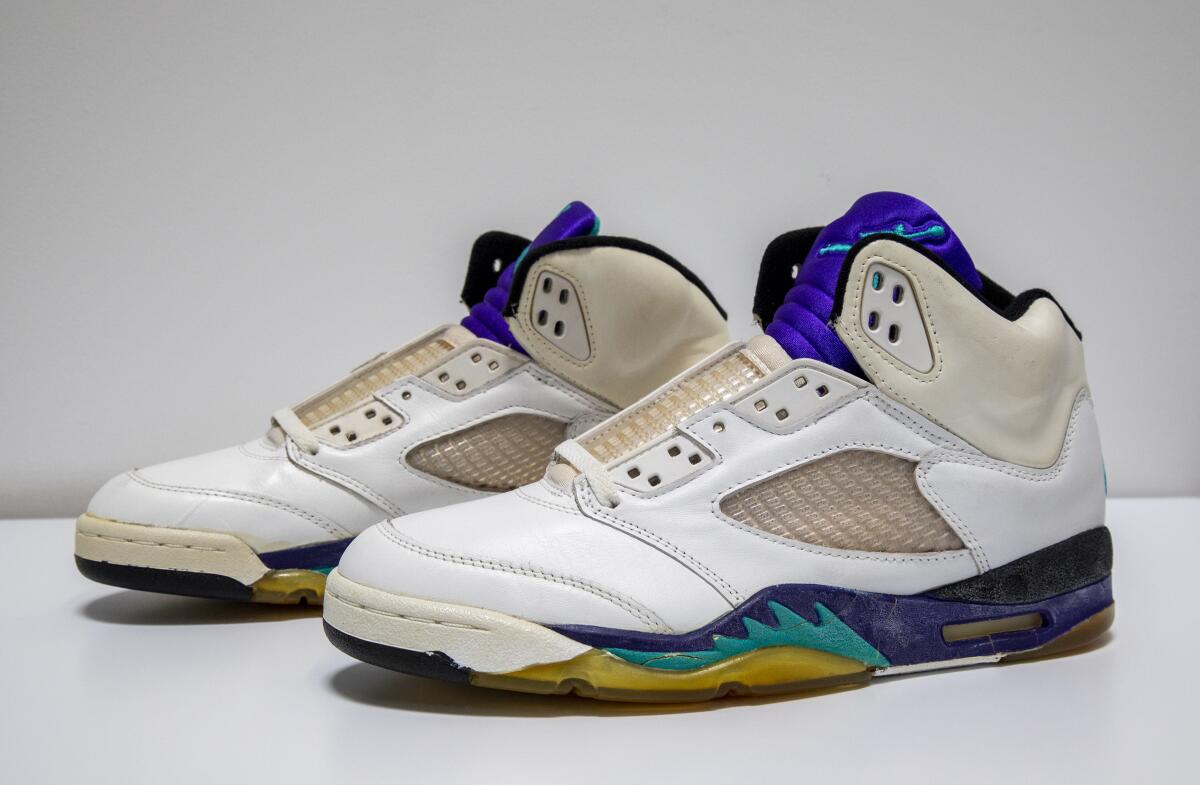
With its emphasis on original sneakers and pro photography, the GOAT website and app can leave some sneakerheads feeling the platform is a bit too posh. But any skepticism about its place in kicks culture was subdued in 2018, when GOAT bought Flight Club, a pioneer in sneaker consignment with stores in New York, Los Angeles and eventually Miami.
Flight Club carried every sneaker brand on the market. The stores also serve as a hangout spot and cultural hub for both hardcore enthusiasts and newbies. Some sneakerheads who had been nearly exclusive users of StockX said the matchup made them view GOAT Group in a new light.
“GOAT was always beautifully curated, very sophisticated,” said Hana Mandapat, a senior marketing director for a Fortune 500 company in California who owns more than 200 pairs of sneakers.
“Everybody knew Flight Club as the physical destination for reselling sneakers,” said Mandapat, 36, whose collection includes every re-release retro version ever made of her favorite, Air Jordan 11 Concords. “With the addition of Flight Club, then it’s like, ‘Ok, you guys are really making a play for this.’”
The Los Angeles Flight Club has been closed since it was damaged during protests in the city. The store is still being remodeled, the company said.
GOAT’s recent expansion into luxury clothing is another move that distinguished it even more from what had been considered its main rival in the online sneaker resale business, StockX. That also positioned it to tap more deeply into the desires of its main clientele, Gen Z and millennial buyers, who make up about 80% of GOAT’s customers, according to Lu.
Both StockX and GOAT have broadened their reach into different kinds of merchandise, but StockX has retained its Wall Street website style, with 52-week resale highs and lows and volatility indexes. The StockX “Stock Market of Things” now includes electronics, watches, handbags, streetwear and trading cards and other collectibles.
In late 2019, GOAT, meanwhile, moved from primarily secondhand into luxury and streetwear apparel and accessories, partnering on product drops with more than 350 brands as different as Alexander McQueen, the British luxury fashion house, and Stussy, the Irvine-based streetwear label.
Like many traders, Johan Aguirre makes a daily check on his holdings’ ups and downs across an electronic spreadsheet.
Lu said the company’s goal is to become the one-stop destination for everything his largest customer group wants to wear from head to toe. “Their shopping habits are different,” he said. “For one outfit, they’re combining and mixing and matching high and low, luxury and affordable, new and used, primary and resold.”
GOAT’s aspirations are playing out daily on social media, said Karsen Woods, chief experience officer at 888 The New World, a new digital art and NFT marketplace.
“You can look online ... where a person has, well, ‘GOATed themselves,’” said Woods, who previously worked in product branding for Superplastic, purveyor of digital and actual toys. “In the streetwear culture we live in, it’s a statement of who you are and how you feel and what you believe in.”
Lu said nostalgia plays a big part in what the company is offering. “If you were nostalgic about something 10 years ago, you can find it on GOAT and we can tell that story of that product, why it’s so special, why it’s an archival piece, or why you should care about this vintage piece,” he said. “That storytelling and that emotion is what GOAT brings.”
Jason Boyce, an ecommerce expert and founder of Avenue7Media, said GOAT’s challenge will be to stay on top of trends and to build partnerships with hot new brands and designers. Luxury apparel “is much more volatile than selling basketball shoes,” he said.
Other successful founders in the sneaker sale and resale space say they aren’t worried about GOAT becoming the next Walmart or Amazon, monopolizing the market and thinning out their business.
“GOAT taking their platform to the next level helps out the whole sneaker market. It brings more hype and demand to the sneaker culture,” said Adeel Shams, co-owner of Cool Kicks, a brick-and-mortar chain that includes a sports card store, a restaurant, and urban chic casual clothing stores, including two on Melrose Avenue in Los Angeles.
The Cool Kicks YouTube channel has more than 1 million subscribers interested in viral uploads such as “I crashed my Rolls Royce Outside Cool Kicks.”
Shams said GOAT’s growth has educated consumers, which means he gets fewer people trying to sell him low-demand shoes for lots of money. The company’s expansion “actually kind of helps us out,” he said, “because it gives sneakers an even bigger market.”
More to Read
Inside the business of entertainment
The Wide Shot brings you news, analysis and insights on everything from streaming wars to production — and what it all means for the future.
You may occasionally receive promotional content from the Los Angeles Times.
